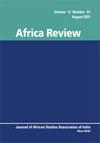了解非洲撒哈拉以南地区内部冲突的框架和外部对叛乱分子的支持
IF 0.5
Q4 AREA STUDIES
引用次数: 0
摘要
自从撒哈拉以南非洲独立以来,致命的内部冲突对该地区的破坏比世界上任何其他地区都要严重。其中一些冲突超越了国界,因为外部国家参与了支持反叛运动。本文的目的是促进对国内冲突的这一国际层面的理解。它发展了一个框架——邪恶联盟,指的是国家和叛军之间的合作关系——来研究外部支持是如何导致国内冲突的爆发和加剧的。我认为,外部国家的支持增强了叛军强化暴力诉求的能力,从而威胁到目标政府。我通过历史过程追踪和一致性观察,以及案例研究方法,使用二手来源的数据,探索1994年至1999年间卢旺达与叛军合作关系的三个实例,以展示它们如何影响刚果民主共和国的内战。本文章由计算机程序翻译,如有差异,请以英文原文为准。
Understanding the Framework of Civil Conflicts and External Support for Insurgents in Africa South of the Sahara
Since independence in Africa south of the Sahara, deadly internal conflicts have wracked the region more than any other in the world. Some of these conflicts transcended national boundaries because external states became involved in supporting rebel movements. The purpose of this paper is to contribute to an understanding of this international dimension of civil conflict. It develops a framework—unholy alignment, referring to the cooperative relationship between states and rebels—to examine how external support leads to the onset and intensification of civil conflict. I argue that external state support augments rebels’ capabilities to intensify violent demands that threaten the target government. I use data from secondary sources through historical process tracing and observation of congruence, and the case studies method, to explore three instances of Rwanda’s cooperative relations with rebels between 1994 and 1999, to show how they shaped civil wars in the DRC.
求助全文
通过发布文献求助,成功后即可免费获取论文全文。
去求助
来源期刊

Africa Review
AREA STUDIES-
CiteScore
1.80
自引率
12.50%
发文量
22
期刊介绍:
Africa Review is an interdisciplinary academic journal of the African Studies Association of India (ASA India) and focuses on theoretical, historical, literary and developmental enquiries related to African affairs. The central aim of the journal is to promote a scholarly understanding of developments and change in Africa, publishing both original scholarship on developments in individual countries as well as comparative analyses examining the wider region. The journal serves the full spectrum of social science disciplinary communities, including anthropology, archaeology, history, law, sociology, demography, development studies, economics, education, gender studies, industrial relations, literature, politics and urban studies.
 求助内容:
求助内容: 应助结果提醒方式:
应助结果提醒方式:


